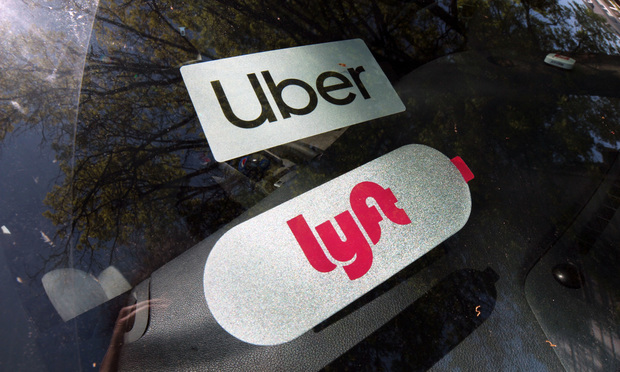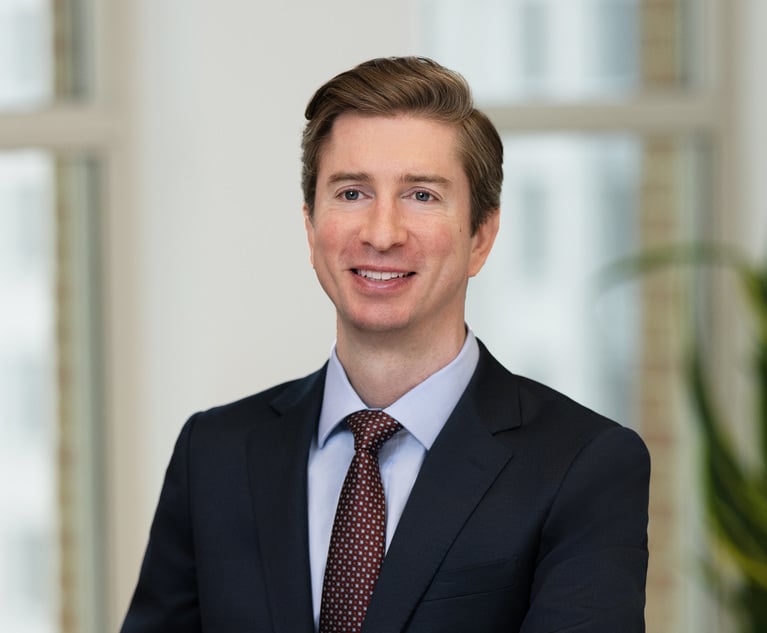PTO Skeptical of Ride-Sharing Patents Asserted Against Lyft and Uber
The Patent Trial and Appeal Board found RideApp Inc. and professor Stephen Dickerson's patents indefinite, but they will get their day in court. In the long run, they'll have to sell U.S. District Judge Jon Tigar on why the PTAB was wrong.
July 23, 2019 at 10:11 PM
3 minute read
 Lyft and Uber sticker on car windshield. (Photo: Daniel Dror/Shutterstock)
Lyft and Uber sticker on car windshield. (Photo: Daniel Dror/Shutterstock)
The retired Georgia Tech professor who says he patented the idea of ride-sharing-by-cellphone 19 years ago got a mixed bag of news from the Patent Trial and Appeal Board last week.
The PTAB declined to review the validity of Stephen Dickerson's patent in a challenge filed by Unified Patents. That means RideApp will probably get its day in court against Lyft in San Francisco and against Uber Technologies in Georgia.
The rest of the news was decidedly bad. That's because the reason the PTAB judges rejected Unified's challenge is that they found the challenged patent claims indefinite.
The patent describes “a wireless means of on-demand allocation of a passenger to a specific vehicle through [a] central data system.” The board found that the claim specification doesn't explain how passenger “allocation” is performed. RideApp pointed to a few flowcharts, but the board found they weren't satisfactory.
The PTAB is not empowered in inter partes review proceedings to invalidate claims for indefiniteness. And because the claims are indefinite, the board can't decide if they're anticipated or obvious. “We are unable to apply the claim language to the prior art,” Judge Jason Melvin wrote in his July 17 order. So the IPR is over.
RideApp is facing another IPR filed by Lyft in February. Assuming the board doesn't institute proceedings there either, the next hurdle facing RideApp will be a Section 101 motion that Lyft has filed in San Francisco and that also turns largely on the meaning of “allocation.”
If RideApp survives the patent eligibility challenge and makes it to claim construction and summary judgment, it will then face some serious explaining about indefiniteness, said Brent Babcock, a PTAB specialist at Womble Bond Dickinson who's not involved in the cases.
The PTAB's claim construction isn't binding on district judges, but it would behoove RideApp to provide a good faith explanation of how the board erred.
“You'd be getting out your microscope and looking over the specification real carefully to point out where the PTAB was wrong,” Babcock said.
“If it's just, 'That's just the board and their decision isn't binding on you, judge,'” that may not cut it, Babcock said, especially now that the PTAB and district courts are using the same claim construction standard.
Unified was represented by Haynes and Boone partners Raghav Bajaj, David McCombs and David O'Dell, plus by Unified in-house attorneys Jonathan Bowser and Ashraf Fawzy. RideApp was represented by Kasowitz Benson Torres senior counsel Ralph Gaskins. The Kasowitz firm also represents RideApp in San Francisco federal court. Kilpatrick Townsend & Stockton represents RideApp in Georgia federal court. Baker Botts represents Lyft at both the PTAB and in San Francisco federal court. No attorney has noticed an appearance yet for Uber in Georgia.
This content has been archived. It is available through our partners, LexisNexis® and Bloomberg Law.
To view this content, please continue to their sites.
Not a Lexis Subscriber?
Subscribe Now
Not a Bloomberg Law Subscriber?
Subscribe Now
NOT FOR REPRINT
© 2025 ALM Global, LLC, All Rights Reserved. Request academic re-use from www.copyright.com. All other uses, submit a request to [email protected]. For more information visit Asset & Logo Licensing.
You Might Like
View All
Meta agrees to pay $25 million to settle lawsuit from Trump after Jan. 6 suspension
4 minute read
How We Won It: Latham Secures Back-to-Back ITC Patent Wins for California Companies
6 minute read

Trending Stories
- 1Gunderson Dettmer Opens Atlanta Office With 3 Partners From Morris Manning
- 2Decision of the Day: Court Holds Accident with Post Driver Was 'Bizarre Occurrence,' Dismisses Action Brought Under Labor Law §240
- 3Judge Recommends Disbarment for Attorney Who Plotted to Hack Judge's Email, Phone
- 4Two Wilkinson Stekloff Associates Among Victims of DC Plane Crash
- 5Two More Victims Alleged in New Sean Combs Sex Trafficking Indictment
Who Got The Work
J. Brugh Lower of Gibbons has entered an appearance for industrial equipment supplier Devco Corporation in a pending trademark infringement lawsuit. The suit, accusing the defendant of selling knock-off Graco products, was filed Dec. 18 in New Jersey District Court by Rivkin Radler on behalf of Graco Inc. and Graco Minnesota. The case, assigned to U.S. District Judge Zahid N. Quraishi, is 3:24-cv-11294, Graco Inc. et al v. Devco Corporation.
Who Got The Work
Rebecca Maller-Stein and Kent A. Yalowitz of Arnold & Porter Kaye Scholer have entered their appearances for Hanaco Venture Capital and its executives, Lior Prosor and David Frankel, in a pending securities lawsuit. The action, filed on Dec. 24 in New York Southern District Court by Zell, Aron & Co. on behalf of Goldeneye Advisors, accuses the defendants of negligently and fraudulently managing the plaintiff's $1 million investment. The case, assigned to U.S. District Judge Vernon S. Broderick, is 1:24-cv-09918, Goldeneye Advisors, LLC v. Hanaco Venture Capital, Ltd. et al.
Who Got The Work
Attorneys from A&O Shearman has stepped in as defense counsel for Toronto-Dominion Bank and other defendants in a pending securities class action. The suit, filed Dec. 11 in New York Southern District Court by Bleichmar Fonti & Auld, accuses the defendants of concealing the bank's 'pervasive' deficiencies in regards to its compliance with the Bank Secrecy Act and the quality of its anti-money laundering controls. The case, assigned to U.S. District Judge Arun Subramanian, is 1:24-cv-09445, Gonzalez v. The Toronto-Dominion Bank et al.
Who Got The Work
Crown Castle International, a Pennsylvania company providing shared communications infrastructure, has turned to Luke D. Wolf of Gordon Rees Scully Mansukhani to fend off a pending breach-of-contract lawsuit. The court action, filed Nov. 25 in Michigan Eastern District Court by Hooper Hathaway PC on behalf of The Town Residences LLC, accuses Crown Castle of failing to transfer approximately $30,000 in utility payments from T-Mobile in breach of a roof-top lease and assignment agreement. The case, assigned to U.S. District Judge Susan K. Declercq, is 2:24-cv-13131, The Town Residences LLC v. T-Mobile US, Inc. et al.
Who Got The Work
Wilfred P. Coronato and Daniel M. Schwartz of McCarter & English have stepped in as defense counsel to Electrolux Home Products Inc. in a pending product liability lawsuit. The court action, filed Nov. 26 in New York Eastern District Court by Poulos Lopiccolo PC and Nagel Rice LLP on behalf of David Stern, alleges that the defendant's refrigerators’ drawers and shelving repeatedly break and fall apart within months after purchase. The case, assigned to U.S. District Judge Joan M. Azrack, is 2:24-cv-08204, Stern v. Electrolux Home Products, Inc.
Featured Firms
Law Offices of Gary Martin Hays & Associates, P.C.
(470) 294-1674
Law Offices of Mark E. Salomone
(857) 444-6468
Smith & Hassler
(713) 739-1250






